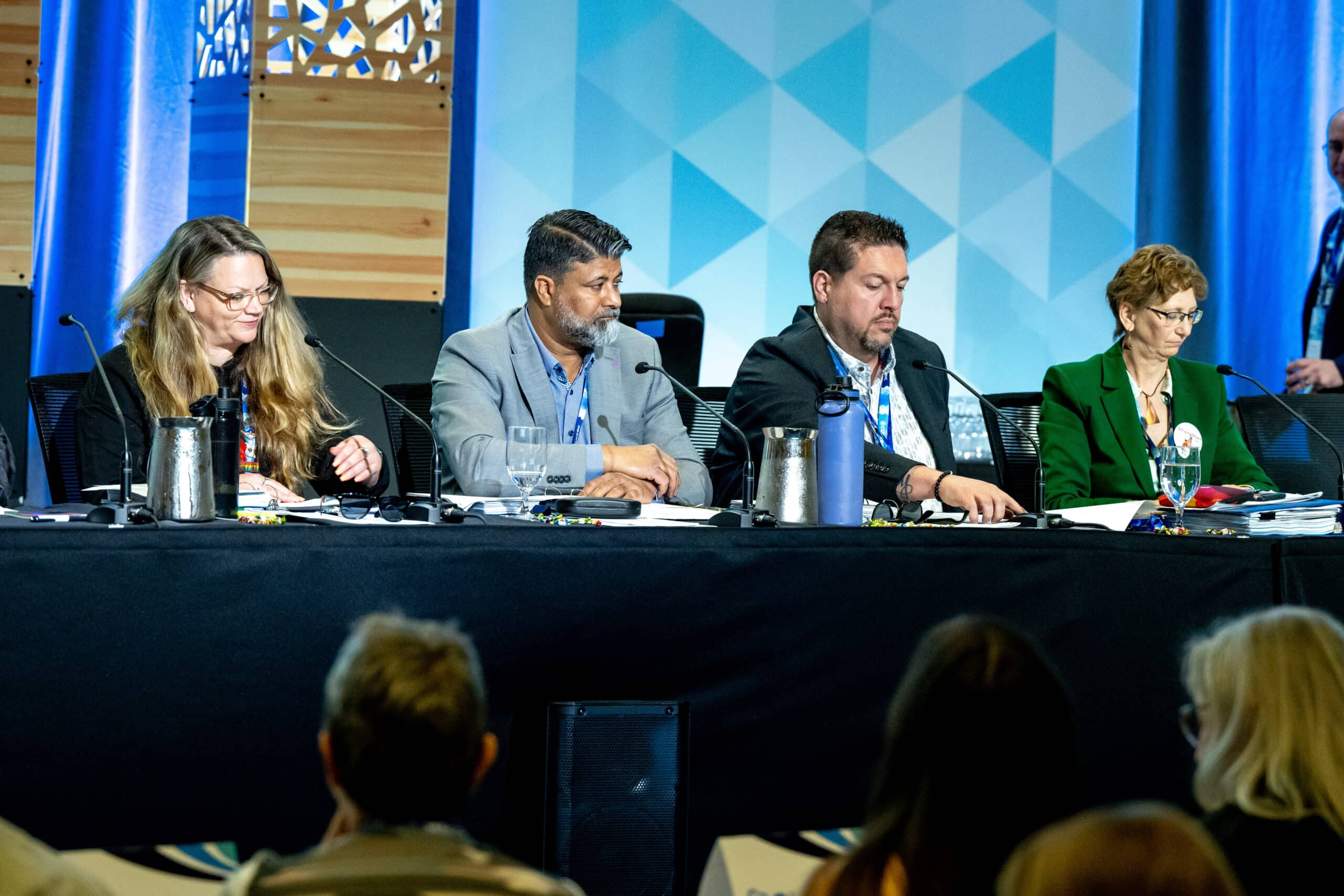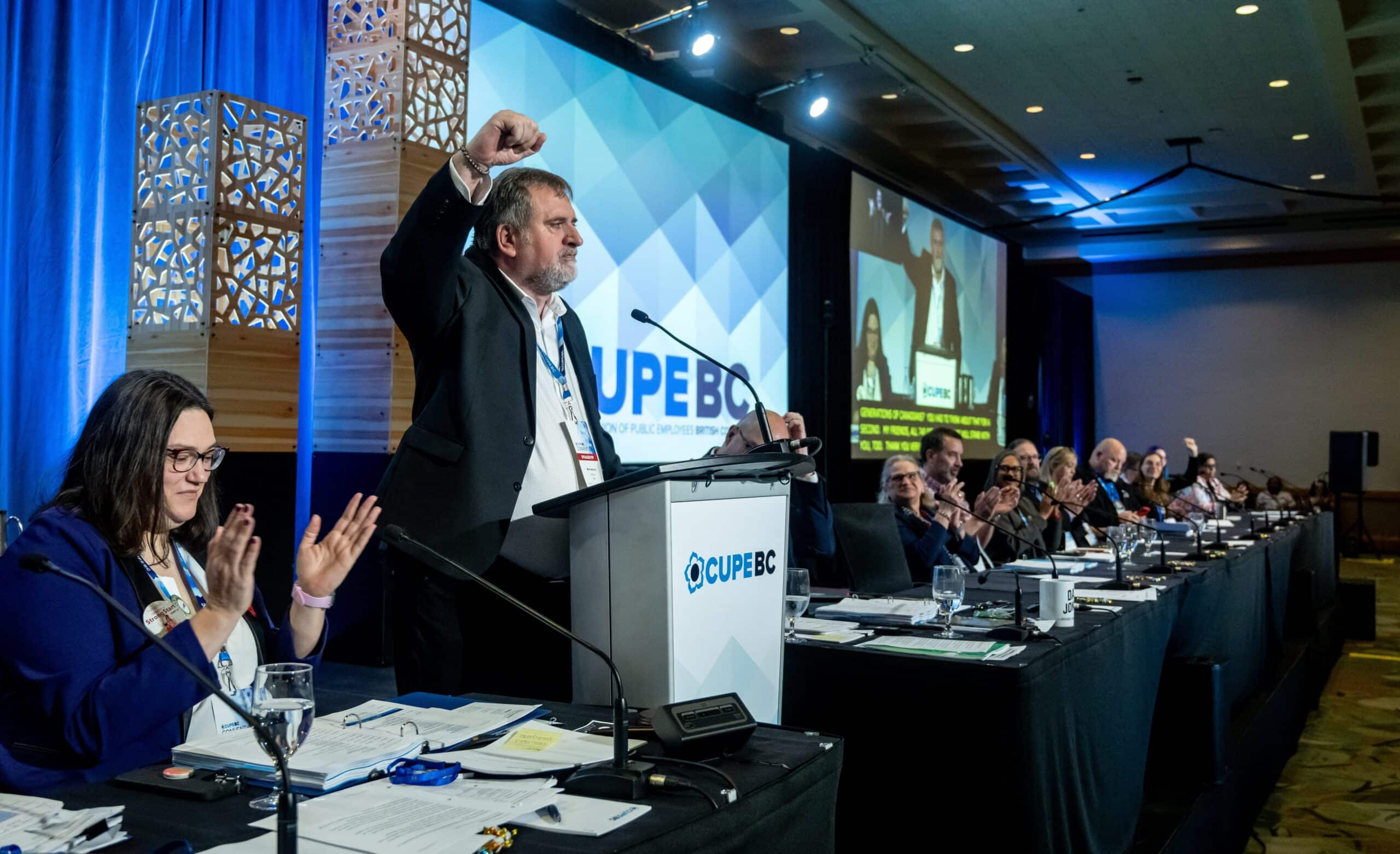SAN PEDRO SULA, HONDURAS – CUPE BC general Vice-President Susan Blair recently took CUPE’s pledge of solidarity and support directly to women in Nicaragua and Honduras. The 10 day trip, organized by Barbara Wood of CoDevelopment Canada, marked the 20th anniversary of CUPE BC’s partnership with MEC – the women’s organization of Maquila (sweatshop/factory) workers.
The delegation, which included representatives from CUPE, BCGEU and CoDev met with women’s organizations in both countries. Some highlights from Susan Blair’s trip diary:
Saturday, March 1 in Nicaragua
We had an informal information meeting and lunch with maquila workers from Nicaragua, Guatemala, El Salvador and Honduras. The women’s organizations have a great respect for CoDev Canada and stressed the importance of CoDev and Canadian union support. All the organizations present voiced the issues of defending dignity, women’s rights, shared experiences, challenges, working conditions and labour rights. We shared a lunch in the MEC offices courtyard. The women pushed us to the front of the line and we noticed all the servers were men – I wonder if that was intentional…
Sunday, March 2 at the MEC 16th Annual Colloquium
It was the 16th anniversary of the Coloquio de Mujeres (Conference of Women) and the 20th anniversary of support by CUPE BC for MEC. One thousand women attended the conference where the document that they had spent two years preparing was presented to government officials. The panel presented the Agenda of the Labour Rights of Women Workers in the Maquiladora Industry in Central America. The report was read out loud in its entirety and stipulates demands for rights that we often take for granted: employment and living wages, occupational health, social security, workplace without violence and harassment.
The key demands these women are making:
- The right to employment and a living wage
- The right to occupational health
- The right to sexual and reproductive health
- The right to social security
- The right to non-workplace violence and sexual harassment
- The right to training and technical assistance
After the reading of the Agenda, it was presented to government officials including a representative of the Nicaraguan Ministry of Labour, a deputy of the National Assembly and the director of the National Commission of Free Trade Zones.
After lunch we were entertained by a band that played salsa music! Women were dancing in the aisles, on the podium, everywhere. Some (including me) even danced on their chairs – and the crowd went wild!
My speech was next. It was very well received, the women cheered a number of times throughout particularly when I stated that CUPE BC’s support would continue. I presented a CUPE certificate to Sandra Ramos, the Executive Director of MEC.
“It’s my pleasure and indeed my honour to present this 20th anniversary certificate to MEC to acknowledge CUPE BC’s 20 year commitment and to cement our continuing relationship.” I was the only one of our delegation to speak but all of us received beautiful plaques.
I was in awe of these women. They were completely focused on the job at hand. Imagine 1,000 CUPE delegates in a room all in agreement with one another! As well, these women are facing almost insurmountable odds, yet they remain eager to keep at it in order to make their lives a little better. I can’t imagine how difficult it must be.
Sunday night – Earthquake! 3.4 on the Richter Scale! We rumbled and shook for quite a while.
Monday, March 3 in the Las Mercedes Free Trade Zone
Our delegation arrived at the Las Mercedes Free Trade Zone at 6 in the morning to meet with MEC and to hand out booklets to the maquila workers as they arrived for work. The booklets were on labour rights, hiv/aids, and law reforms on violence against women. We had 6,000 to hand out to the 10,000 workers streaming past us. The MEC women kept handing me stacks of booklets and would push me into the crowd where I tried my rusty Spanish. The workers were very accommodating, even though I was in their way they reached out for the booklets and thanked me. A very humbling experience.
Wednesday, March 5 in San Pedro Sula, Honduras
It feels less secure here – we’re not allowed out by ourselves and in the evening we stay in – the central park across from our hotel is deserted by early evening. We were told that it’s just not safe – women get beaten, robbed and raped and men get murdered while the government does nothing. We met with women working in Honduran maquilas with stories of deplorable working conditions.
Met with CODEMUH, the Womens Collective of Honduras and their representatives Maria Luisa Regalado and Carlos Amaya. Carlos gave us an overview of the situation in Honduras – what struck me was how much the rights citizens had achieved in the 1050-60s have been eroded .
Under the Conservative government in Honduras the law against domestic violence has been “reformed” to make it a private crime that is now not an automatic charge and it’s a crime for media to report on domestic violence. Women can’t be accompanied to court for support and youth, women and GLBT are common targets for violence. The new rightwing president says women should be back in the home making tortillas looking after children and the husband and can have a small home business making tortillas if they want! . I’m just not sure how families could survive on less money than they make now. Unemployment is around 60%.
This afternoon we visited the CODEMUH staff in Choloma – Rayna, Gladys, Floris, Maria Luisa and Ruth. CODEMUH started 25 years ago with informal meetings under an avocado tree to discuss health and legal issues. In the beginning, many women couldn’t come out because their husbands, fathers, brothers wouldn’t let them go so they centred the meetings around “crafts” like making jewelry to mask their political organizing. Still, many men called the CODEMUH women witches because they were standing up for their rights. The women embraced the term and now use the witch symbol in their work.
We met with maquila workers to hear about their work lives and family lives. Their work days are 12 hours long and they make so little money that they take more shifts (no overtime) sometimes working six days per week. The managers frown on breaks so the women stop drinking water. Some of these women are in their mid-thirties and can hardly work any longer because of repetitive strain injuries. Their injuries are permanent so the corporations try to fire them. If they get pregnant they get fired. CODEMUH provides legal support, psychological support and medical support.
Some of the women we got to meet:
Anna Miranda – Now in her mid 30s, she was involved with CODEMUH before her health problems. She has 24% damage to her right shoulder, back pain and osteoporosis – usually seen in older workers. At Gildan she worked hard and had high personal production goals. Now she earns one-third of her previous salary. Social security has requested she be relocated to other work. She is now isolated in the corner of the factory hidden away if inspectors visit. She is not allowed to speak to others and serves as a warning to others in the factory.
Name withheld – 21 years old, college grad, wanted to go to university but with her shifts she couldn’t. Diagnosis – chronic neck injury. She will be getting a second diagnosis soon with help from CODEMUH. She’s still not working but awaiting pension determination. When Canadian investors come by for a tour of the factory, the managers clean the workplace, give workers new shirts and ear/face protection, fix the toilets and paper in the bathrooms, and clean and stock the kitchens.
Rosa Maria – 32 years old, has worked half her life as a maquila worker. After seven years she started to suffer severe back pain with a partial permanent injury of 37%. She was a machinist but has severe injury to both shoulders and no strength in her hands. Her medical certificate gets her $15 a week, her job pays her $60 per week. Rosa is a single mother with four kids and she cannot cover expenses. She demanded a raise but her manager refused. The company is considering reducing wages by the percentage of disability pension.
Saturday, March 8 – International Women’s Day
After a great swim in the Caribbean, we then drove to Choloma for IWD. In the central park we had to compete with a religious band which cranked up their music and called us witches. When the band finally left we were honoured to see three short skits performed by CODEMUH activists – no translation needed, the message was clear! An honour to share International Women’s Day with these gracious, accommodating, eloquent, gentle, lovely, cheeky compañeras.
For more photos visit the CUPE BC Gallery





